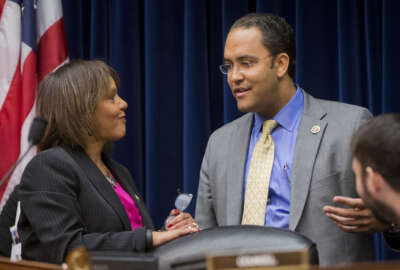
‘No hype, no aspirational talk:’ GSA sheds light on upcoming RPA forum
Justin Herman, the head of GSA's Emerging Citizen Technology office, said Tuesday that the agency plans to host on a governmentwide forum on robotic process...
The General Services Administration’s emerging technology office has big plans for the start of the new year.
Justin Herman, the head of GSA’s Emerging Citizen Technology office, said Tuesday that the agency plans to host a governmentwide forum on robotic process automation (RPA) on Jan. 19.
RPA is a type of machine learning that eliminates rote tasks — like copying and pasting data on forms — from employees’ daily workloads, and has gained a foothold at agencies like GSA, the IRS and the Department of Health and Human Services.
GSA is also building a public-private partnership to ensure agencies’ adoption of emerging technology doesn’t prevent people with disabilities and older Americans from accessing information online.
During a “fireside chat” livestream Tuesday, Herman said his office’s upcoming projects reflect a need for government to find a “pragmatic middle ground” on emerging technology and recognizing both the risks and opportunities they present.
“A lot of times — whether it’s AI, blockchain, robotic process automation or augmented virtual reality — people make the wrong assumption that if you’re talking about it, that means you’re endorsing it for all things,” Herman said.
What to expect from GSA’s ‘RPA Day’
GSA’s upcoming “RPA Day” event will closely resemble the Future Services Now conference the agency hosted in October, according to meeting notes posted Monday to the Emerging Citizen Technology office’s website.
The event will focus on “building, testing and deploying” RPA, as well as its impact on federal employees. Herman added that the event aims to dispel some fears that RPA could take jobs away from the federal workforce.
“All presenters must have successfully deployed RPA within a government agency, and all programming must align with the President’s Management Agenda and related Cross-Agency Priority Goals,” the website states. “No hype, no aspirational talk, and no guff about it — all RPA for IT modernization in FY 19.”
Laura Manley, the director of the Technology and Public Purpose Project at the Harvard Kennedy School’s Belfer Center for Science and International Affairs, also speaking Tuesday, said her new office will study the future of the government workforce — including possible job displacement as the result of emerging tech, as well as opportunities to reskill and retrain employees.
“That’s absolutely going to be a priority area for us,” Manley said. “If you focus too heavily only on the opportunities or only on the catastrophic risks, you’re really missing the picture, because the world doesn’t work in that black-and-white way.”
The emerging tech office will partner with GSA’s Office of the Chief Financial Officer, and their RPA manager Ed Burrows. GSA is also tentatively working with Challenge.gov to launch a process improvement competition during the RPA Day.
Also in January, the emerging tech office together with GSA’s Office of the Chief Financial Officer expect to launch a new governmentwide RPA community and executive council.
Robotic process automation not for everybody
Despite the gaining popularity of RPA use cases in government, Herman cautioned that agencies don’t necessarily need to use cutting-edge tools to improve some burdensome processes.
“More often than not, you can find that you can repurpose existing technologies, maybe in ways you didn’t think about, in order to get the same outcome, and that’s a success,” Herman said.
Agencies might also want to consider changing out-of-date processes, rather than bringing new tools into the mix.
“Even evaluating for emerging tech has caused them to look at their problems in government in new ways,” Herman said. They might not have reviewed a process in a long time, and they delete it.”
Making emerging tech accessible for everyone
Also in 2019, GSA expects to partner with the Labor Department’s Office of Disability Employment Policy and the Partnership on Employment and Accessible Technology (PEAT) to ensure emerging tech use in government doesn’t keep people with disabilities and older Americans from accessing information online.
“We can design and bake into our programs [and] unintentionally make things that are meant to bring more people to the table, and in fact, make it more exclusive,” Herman said. “That’s something that we obviously need to better understand.”
Copyright © 2025 Federal News Network. All rights reserved. This website is not intended for users located within the European Economic Area.
Jory Heckman is a reporter at Federal News Network covering U.S. Postal Service, IRS, big data and technology issues.
Follow @jheckmanWFED
Related Stories





